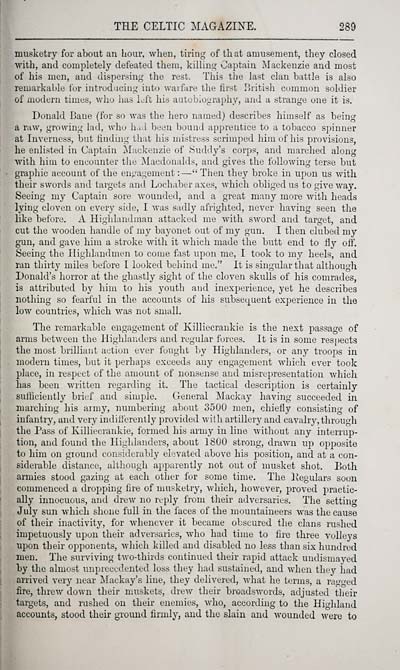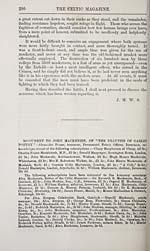Blair Collection > Celtic magazine > Volume 2
(299)
Download files
Complete book:
Individual page:
Thumbnail gallery: Grid view | List view

THE CELTIC MAGAZINE. 289
musketry for about an hour, when, tiring of that amusement, they closed
■with, and completely defeated them, killing Captain Mackenzie and most
of his men, and dispersing the rest. This the last clan battle is also
remarkable for introducing into warfare the first British common soldier
of modern times, who lias loft his autobiography, and a strange one it is.
Donald Bane (for so was the hero named) describes himself as being
a raw, growing lad, who hail been bound apprentice to a tobacco spinner
at Im'erness, but finding that his mistress scrimped him of his provisions,
he enlisted in Captain jiackenzie of buddy's corps, and marched along
with hiui to encounter the ?\racdonalds, and gives the following terse but
graphic account of the euj.'agenient : — " Then they broke in upon us with
their swords and targets and Lochaber axes, which obliged us to give way.
Seeing my Captain sore wounded, and a great many more with heads
lying cloven on every side, I was sadly afrighted, never having seen the
like before. A Highlandman attacked me with sword and target, and
cut the wooden handle of my bayonet out of my gun. I then clubed my
gun, and gave him a stroke witli it which made the butt end to fly off.
Seeing the Highlandmen to come fast upon me, I took to my heels, and
ran thirty miles before I looked behind me." It is singular that although
Donald's horror at the ghastly sight of the cloven skulls of his comrades,
is attributed by him to his youtli and inexperience, yet he describes
nothing so fearful in the accounts of his subsequent experience in the
low countries, which was not small.
The remarkable engagement of Killiecrankie is the next passage of
arms between the Highlanders and regular forces. It is in some respects
the most brdliant action ever fought by Highlanders, or any troops in
modern times, but it perhaps exceeds any engagement which ever took
place, in respect of the amount of nonsense and misrepresentation which
has been written regarding it. The tactical description is certainly
sufficiently brief and simple. General Mackay having succeeded in
marching his army, numbering about 3500 men, chiefly consisting of
infantry, and very inditlerenlly provided with artillery and cavalry, through
the Pass of Killiecrankie, formed his army in line without any interrup-
tion, and found the Highlanders, about 1800 strong, drawn up opposite
to him on ground considerably elevated above his position, and at a con-
siderable distance, although apparently not out of musket shot. Both
armies stood gazing at each other for some time. The Regulars soon
commenced a dropping fire of musketry, which, however, proved practic-
ally innocuous, and drew no ruply from tlieir adversaries. The setting
July sun Avhich shone full in the faces of the mountaineers was the cause
of their inactivity, for whenever it became obscured the clans rushed
impetuously upon their adversaries, who had time to fire three volleys
upon their opponents, which killed and disabled no less than six hundred
men. The surviving two-thirds continued their rapid attack undismayed
by the almost unprecedented loss they had sustained, and Avhen they had
arrived ver}^ near Mackay's line, they delivered, what he terms, a ragged
fire, threw down their muskets, drew their bi'oadswords, adjusted tlieir
targets, and rushed on their enemies, who, according to the Highland
accounts, stood their groiuid firndy, and the slain and wounded were to
musketry for about an hour, when, tiring of that amusement, they closed
■with, and completely defeated them, killing Captain Mackenzie and most
of his men, and dispersing the rest. This the last clan battle is also
remarkable for introducing into warfare the first British common soldier
of modern times, who lias loft his autobiography, and a strange one it is.
Donald Bane (for so was the hero named) describes himself as being
a raw, growing lad, who hail been bound apprentice to a tobacco spinner
at Im'erness, but finding that his mistress scrimped him of his provisions,
he enlisted in Captain jiackenzie of buddy's corps, and marched along
with hiui to encounter the ?\racdonalds, and gives the following terse but
graphic account of the euj.'agenient : — " Then they broke in upon us with
their swords and targets and Lochaber axes, which obliged us to give way.
Seeing my Captain sore wounded, and a great many more with heads
lying cloven on every side, I was sadly afrighted, never having seen the
like before. A Highlandman attacked me with sword and target, and
cut the wooden handle of my bayonet out of my gun. I then clubed my
gun, and gave him a stroke witli it which made the butt end to fly off.
Seeing the Highlandmen to come fast upon me, I took to my heels, and
ran thirty miles before I looked behind me." It is singular that although
Donald's horror at the ghastly sight of the cloven skulls of his comrades,
is attributed by him to his youtli and inexperience, yet he describes
nothing so fearful in the accounts of his subsequent experience in the
low countries, which was not small.
The remarkable engagement of Killiecrankie is the next passage of
arms between the Highlanders and regular forces. It is in some respects
the most brdliant action ever fought by Highlanders, or any troops in
modern times, but it perhaps exceeds any engagement which ever took
place, in respect of the amount of nonsense and misrepresentation which
has been written regarding it. The tactical description is certainly
sufficiently brief and simple. General Mackay having succeeded in
marching his army, numbering about 3500 men, chiefly consisting of
infantry, and very inditlerenlly provided with artillery and cavalry, through
the Pass of Killiecrankie, formed his army in line without any interrup-
tion, and found the Highlanders, about 1800 strong, drawn up opposite
to him on ground considerably elevated above his position, and at a con-
siderable distance, although apparently not out of musket shot. Both
armies stood gazing at each other for some time. The Regulars soon
commenced a dropping fire of musketry, which, however, proved practic-
ally innocuous, and drew no ruply from tlieir adversaries. The setting
July sun Avhich shone full in the faces of the mountaineers was the cause
of their inactivity, for whenever it became obscured the clans rushed
impetuously upon their adversaries, who had time to fire three volleys
upon their opponents, which killed and disabled no less than six hundred
men. The surviving two-thirds continued their rapid attack undismayed
by the almost unprecedented loss they had sustained, and Avhen they had
arrived ver}^ near Mackay's line, they delivered, what he terms, a ragged
fire, threw down their muskets, drew their bi'oadswords, adjusted tlieir
targets, and rushed on their enemies, who, according to the Highland
accounts, stood their groiuid firndy, and the slain and wounded were to
Set display mode to: Large image | Transcription
Images and transcriptions on this page, including medium image downloads, may be used under the Creative Commons Attribution 4.0 International Licence unless otherwise stated. ![]()
| Early Gaelic Book Collections > Blair Collection > Celtic magazine > Volume 2 > (299) |
|---|
| Permanent URL | https://digital.nls.uk/78483742 |
|---|
| Description | Volume II, 1877. |
|---|---|
| Shelfmark | Blair.3 |
| Attribution and copyright: |
|
| Description | A selection of books from a collection of more than 500 titles, mostly on religious and literary topics. Also includes some material dealing with other Celtic languages and societies. Collection created towards the end of the 19th century by Lady Evelyn Stewart Murray. |
|---|
| Description | Selected items from five 'Special and Named Printed Collections'. Includes books in Gaelic and other Celtic languages, works about the Gaels, their languages, literature, culture and history. |
|---|

